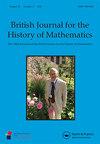‘What to solve?’ – on Judita Cofman’s research on mathematics and its teaching
IF 0.3
Q3 MATHEMATICS
British Journal for the History of Mathematics
Pub Date : 2022-01-02
DOI:10.1080/26375451.2022.2047575
引用次数: 0
Abstract
In 2021 Mainz university (founded in 1477) celebrated the seventy-fifth anniversary of its re-opening after its closure in the wake of the Napoleonic Wars. The mathematical department seized the opportunity to commemorate its first female professor of mathematics, Judita Cofman (1936–2001), by an online symposium in November 2021, which was organized by Dr Martina R Schneider. Judita Cofman was trained as a mathematics teacher and did a PhD in the field of finite geometries in Novi Sad (Yugoslavia) in 1963, after a research stay in Rome. She worked as a mathematician at the universities of Frankfurt amMain, London, Tübingen and Mainz. In 1978 she quit her job as professor at Mainz university to become a teacher of mathematics at Putney High School in London. In 1993 she was appointed professor of didactics of mathematics at the university of Erlangen-Nürnberg. After her retirement in 2001 she re-located to Debrecen (Hungary) and continued her work at the local university (Nikolić 2012, 2014). This short biography alone raises many questions. The symposium has made clear that Judita Cofman’s research and biography are not only of local historical interest. In addition to that, they touch upon several topics in the history of twentieth-century European mathematics that have been neglected or need further investigation. To mention only one: the exploration of Cofman’s biographical trajectory from Yugoslavia via Italy, the UK, and (West) Germany to Hungary promises new insights into the processes of circulation of mathematical and teaching practices and cultures between the East and the West during the Cold War and thereafter. The first section of the symposium was devoted to Cofman as a mathematician in Mainz. Andrea Blunck (Hamburg) gave a talk on women in mathematics in Germany. This made clear that Cofman’s appointment as professor in Mainz in 1973 fell in a“解决什么问题?”——评考夫曼对数学及其教学的研究
2021年,美因茨大学(成立于1477年)庆祝了其在拿破仑战争后关闭后重新开放75周年。数学系借此机会,于2021年11月举办了由Martina R Schneider博士组织的在线研讨会,以纪念其第一位女数学教授Judita Cofman(1936-2001)。朱迪塔·科夫曼(Judita Cofman)在罗马进行研究后,于1963年在诺维萨德(南斯拉夫)获得了有限几何领域的博士学位。她曾在法兰克福大学、美因大学、伦敦大学、宾根大学和美因茨大学担任数学家。1978年,她辞去美因茨大学教授的工作,成为伦敦普特尼高中的一名数学教师。1993年,她被任命为埃尔兰根-新伦堡大学数学教学法教授。2001年退休后,她搬到了德布勒森(匈牙利),并继续在当地大学工作(nikoliki 2012, 2014)。这篇简短的传记本身就提出了许多问题。研讨会已经明确表明,朱迪塔·考夫曼的研究和传记不仅是当地的历史兴趣。除此之外,他们还触及了二十世纪欧洲数学历史中被忽视或需要进一步研究的几个主题。仅举一例:对科夫曼从南斯拉夫、意大利、英国、(西德)德国到匈牙利的生平轨迹的探索,有望对冷战期间及之后东西方之间数学、教学实践和文化的循环过程产生新的见解。研讨会的第一部分专门介绍了作为美因茨数学家的考夫曼。安德里亚·布伦克(汉堡)做了一个关于德国女性在数学领域的演讲。这清楚地表明,1973年,考夫曼被任命为美因茨大学的教授,这是一个失败的决定
本文章由计算机程序翻译,如有差异,请以英文原文为准。
求助全文
约1分钟内获得全文
求助全文
来源期刊

British Journal for the History of Mathematics
Arts and Humanities-History and Philosophy of Science
CiteScore
0.50
自引率
0.00%
发文量
22
 求助内容:
求助内容: 应助结果提醒方式:
应助结果提醒方式:


